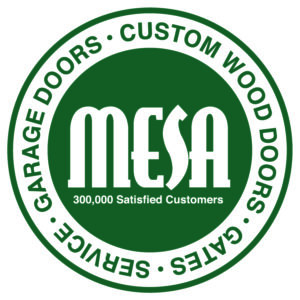Why Your Garage Door Is Noisy — And How To Quiet It Down
A noisy garage door at your Los Angeles, CA area home typically indicates worn rollers, loose hardware, or a lack of lubrication—issues that require professional attention. Fortunately, the experts at Mesa Garage Doors offer a range of reliable garage door services, including quality repairs and more.
Here are some common reasons why your garage door is noisy, what the noises mean, and when to contact a professional for repair services.
Common Reasons Your Garage Door Is Noisy
Here are some common problems that may cause garage door noises.
Worn Rollers
Garage door rollers guide the door along the tracks. However, they can begin to wear out over time, corrode, or undergo damage. This may result in several jarring noises whenever the door opens or closes. If you suspect you have worn-out rollers, our team is available to replace them with newer options made of steel or nylon to reduce noise and improve longevity.
Loose Hardware
Parts like screws, nuts, and bolts can become loose over time due to the constant vibrations that occur when your door is in operation. Check your hardware regularly to make sure everything is tight and in good condition. In most cases, simply tightening the existing hardware can eliminate the noise.
Inadequate Lubrication
Rollers, hinges, springs, and tracks require garage door lubrication for proper operation and to minimize friction and noise. If these parts aren’t adequately lubricated, they’ll start to rub against each other and make odd noises. Check that all moving parts are properly lubricated and use a specifically formulated garage door lubricant, such as white lithium grease, to resolve the issue.
Other Common Causes
Another reason your garage door is making noise could be due to an imbalanced door or improper door installation. Bent or misaligned tracks may also cause the door to rub, while broken or worn torsion or extension springs may produce odd noises. A common garage door opener noise may occur when the opener’s chain or belt is worn, loose, or improperly adjusted.
What Different Garage Door Noises Might Mean
- Squeaking, screeching, or vibrating: Commonly caused by worn, broken, or corroded rollers.
- Rattling or banging: Often a result of loose hardware that should be tightened or replaced.
- Grinding or screeching: Caused by improper lubrication of moving parts inside your garage door.
- Slapping or rattling: Due to improper installation or an unbalanced door.
- Creaking or popping: Caused by bad or stretched garage door springs.
When To Call in a Professional
- Noises persist or get worse: Indicates a more serious underlying problem requiring professional help.
- Unusual or very loud noises: Should be addressed as soon as possible.
- Loud bangs: Could be due to a broken spring or cable — potentially dangerous to handle alone.
- Door is jerky or uneven: This could indicate a serious mechanical issue that needs expert repair.
- Visible damage: Should be inspected and addressed by a professional technician.
How Insulation and Modern Doors Can Reduce Noise
Quality insulation and modern garage doors can reduce noise and restore your home’s peaceful environment. The right garage door insulation, such as foam board or fiberglass, absorbs excess vibration and minimizes rattling and other noises. Insulation also creates a physical sound barrier, reducing the movement of sound waves and minimizing the transfer of noise from the outside and inside of the garage.
Modern garage door designs feature numerous updated elements specifically designed for noise reduction. Extra-durable steel frames, unique support systems, and updated hardware — such as the Stealth Hinge Garage Door System — are among the many new features that help keep garage door noises to a minimum. Other features include nylon rollers, belt-drive garage door openers, and DC motor openers.
Preventive Maintenance Tips To Keep Your Garage Door Quiet
- Keep all moving parts lubricated using white lithium grease or a silicone-based spray.
- Schedule regular garage door inspections to find issues early and repair them before they become serious.
- Clean the tracks regularly using a brush or cloth to remove dirt and debris, and use a degreaser as needed.
- Inspect the rollers for wear and tear, and replace them as needed — nylon rollers are quieter than steel.
- Balance your garage door for smooth, quiet operation.
Contact Mesa Garage Doors Today
If a noisy garage door is causing problems at your Los Angeles area home, Mesa Garage Doors are the go-to experts for noise-reducing upgrades. Whether you need repairs, a tune-up, or a full garage door replacement, we’re ready to serve you. Contact us today to schedule service or request an estimate for new garage doors.
Mr. Saunders serves as Mesa’s Vice President of Marketing, bringing with him a wealth of experience in strategic marketing and operations. In this role, Mr. Saunders is responsible for overseeing all marketing activities, utilizing a blend of traditional and digital strategies to enhance brand presence and profitability, managing a multi-million dollar marketing budget across various media platforms, and leading the continued implementation of CRM systems to streamline customer engagement and drive business growth.















